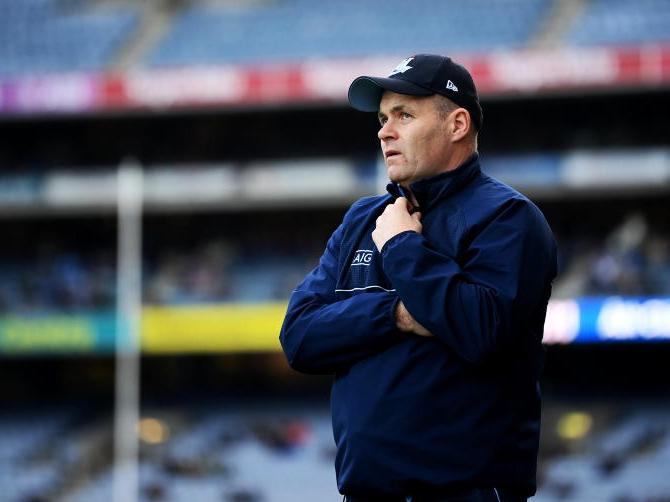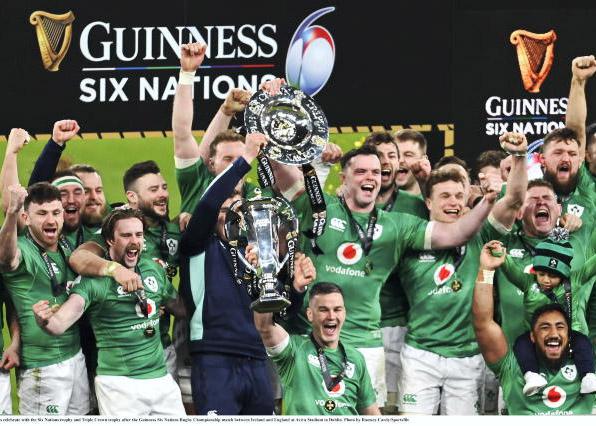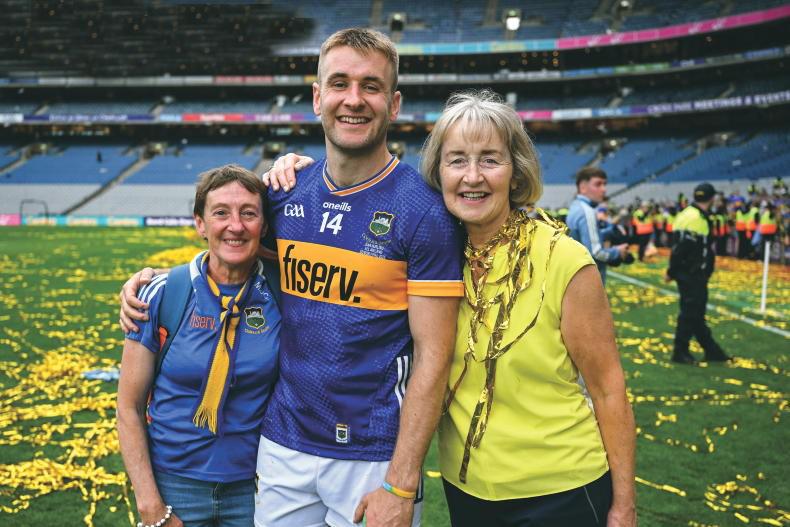Has your Monday morning routine been badly affected these last few weeks?
Did you open up your daily newspaper of choice – or go online – only to be left bereft by the lack of insight from inter-county GAA managers?
No reassurance of: “We won and we’re happy but it’s only the league and we’re keen to keep moving on.”
Or: “We lost and we’re not panicking but Championship is only just around the corner and we have to pick things up”?
When, if we’re any way honest with ourselves, did we read post-match quotes from a boss and come away having learned something? I can remember, back when José Mourinho was still successful and relevant, he briefly pulled back the curtain to reveal that his comments before or after a game generally weren’t for the fans or anyone else but actually for the players in his own dressing room. That, or self-interest in the hope of putting pressure on the authorities.
The root cause of the omertà is a Gaelic Players Association (GPA) dispute with the GAA over the restoration of mileage allowances to players to pre-COVID-19 levels – but it should be noted that that restoration has taken place, once teams don’t gather more than four times a week. Surely, as the representative body, the GPA should be acting to avoid burnout?
But back to the quotes, or lack of them. In professional sport, such media engagements are part of a contractual obligation, but in GAA, these gatherings can often feel like a huge inconvenience for the men in charge, especially after a defeat. Certainly, we would be willing to bet that quite a few journalists won’t have been too put out by not having to stand outside a dressing for 15 or 30 minutes, waiting for quotes that they could almost have composed themselves beforehand.
Managers, not wanting to give any hostages to fortune, do their best to say nothing unless there’s an agenda they want to drive. The levels of control and paranoia mean that player interviews are generally off limits too, apart from the occasional press evening where the journalists will have to do their best to get a good line or two in a group interview, but even then the player will be on high alert and will generally only talk up the opposition.
Obviously, as a sports journalist, there is a vested interest here but the sterile environment around player interviews means that the supporters are denied the opportunity to build an impression of their heroes beyond what they see inside the white lines.
The flipside is that we are forced to be more creative in what we come up with and profile pieces – talking to people who know the players and saw them from a young age – can often throw up some good background. While there has been a definite improvement in the levels of analysis and data-mining based on the statistics available, things are still at a nascent stage from that point of view.
Don’t take it
for granted
Last year, during one of the lockdowns, I took delivery of a few large baskets of secondhand sports books that were going to be thrown out.
Some of them ended up being thrown out by me anyway – emblems of a lack of quality control on the part of publishing houses – but there was a lot there to help me while away the large amounts of dead time.
One autobiography I read was that of English golfer Tony Jacklin. Having won the Open Championship in 1969 and then the US Open in 1970, he was established as one of the world’s best and it seemed as if a second Open was in his grasp in 1972.
However, he allowed a miracle chip from Lee Trevino on the 71st hole at Muirfield to knock him out of his stride, allowing the Texan to win, and despite having played a superb tournament overall, the loss affected Jacklin to the extent that he never really contended for another major.
Just in case you’re a golf-hater, hang on, for this part of the column is actually about rugby, but also the importance of essentially judging your own performances and results on their own merits rather than through any other prisms.
To compare is to despair, as a motivational image on Instagram might have it.
For a couple of hours on Saturday evening, the period between the end of the game against Scotland at Aviva Stadium and England’s challenge finally being extinguished by France in Paris, Ireland had completed Schrödinger’s Six Nations campaign.
Andy Farrell’s team had done what they had done – four wins from five, with five out of six possible bonus points claimed – and that was going to be good enough for either first or second place in the table. However, the final destiny was not in their own hands and France completed the job against an England side that was going to have to show an improvement that didn’t really look to be within their remit.
Somewhat surprisingly, it’s France’s first title since 2010, when they also won the Grand Slam, and they will be happy with where they are ahead of next year’s World Cup. Ultimately, so too should Ireland – after all, if Eddie Jones’s men had conjured an unlikely win, Ireland would have been champions and the 1990s are still too recent in the memory for any one of us to turn our noses up at ‘just’ a championship. Indeed, a Triple Crown shouldn’t be taken for granted either, given how we had to wait from 1986-2004 to achieve one of those.
Regardless of the final ranking, Ireland did well, but there would still be the same things to work on even if they could call themselves European champions. But the positives are far more plentiful and the mindset should be that there are only a small few improvements needed. CL
Has your Monday morning routine been badly affected these last few weeks?
Did you open up your daily newspaper of choice – or go online – only to be left bereft by the lack of insight from inter-county GAA managers?
No reassurance of: “We won and we’re happy but it’s only the league and we’re keen to keep moving on.”
Or: “We lost and we’re not panicking but Championship is only just around the corner and we have to pick things up”?
When, if we’re any way honest with ourselves, did we read post-match quotes from a boss and come away having learned something? I can remember, back when José Mourinho was still successful and relevant, he briefly pulled back the curtain to reveal that his comments before or after a game generally weren’t for the fans or anyone else but actually for the players in his own dressing room. That, or self-interest in the hope of putting pressure on the authorities.
The root cause of the omertà is a Gaelic Players Association (GPA) dispute with the GAA over the restoration of mileage allowances to players to pre-COVID-19 levels – but it should be noted that that restoration has taken place, once teams don’t gather more than four times a week. Surely, as the representative body, the GPA should be acting to avoid burnout?
But back to the quotes, or lack of them. In professional sport, such media engagements are part of a contractual obligation, but in GAA, these gatherings can often feel like a huge inconvenience for the men in charge, especially after a defeat. Certainly, we would be willing to bet that quite a few journalists won’t have been too put out by not having to stand outside a dressing for 15 or 30 minutes, waiting for quotes that they could almost have composed themselves beforehand.
Managers, not wanting to give any hostages to fortune, do their best to say nothing unless there’s an agenda they want to drive. The levels of control and paranoia mean that player interviews are generally off limits too, apart from the occasional press evening where the journalists will have to do their best to get a good line or two in a group interview, but even then the player will be on high alert and will generally only talk up the opposition.
Obviously, as a sports journalist, there is a vested interest here but the sterile environment around player interviews means that the supporters are denied the opportunity to build an impression of their heroes beyond what they see inside the white lines.
The flipside is that we are forced to be more creative in what we come up with and profile pieces – talking to people who know the players and saw them from a young age – can often throw up some good background. While there has been a definite improvement in the levels of analysis and data-mining based on the statistics available, things are still at a nascent stage from that point of view.
Don’t take it
for granted
Last year, during one of the lockdowns, I took delivery of a few large baskets of secondhand sports books that were going to be thrown out.
Some of them ended up being thrown out by me anyway – emblems of a lack of quality control on the part of publishing houses – but there was a lot there to help me while away the large amounts of dead time.
One autobiography I read was that of English golfer Tony Jacklin. Having won the Open Championship in 1969 and then the US Open in 1970, he was established as one of the world’s best and it seemed as if a second Open was in his grasp in 1972.
However, he allowed a miracle chip from Lee Trevino on the 71st hole at Muirfield to knock him out of his stride, allowing the Texan to win, and despite having played a superb tournament overall, the loss affected Jacklin to the extent that he never really contended for another major.
Just in case you’re a golf-hater, hang on, for this part of the column is actually about rugby, but also the importance of essentially judging your own performances and results on their own merits rather than through any other prisms.
To compare is to despair, as a motivational image on Instagram might have it.
For a couple of hours on Saturday evening, the period between the end of the game against Scotland at Aviva Stadium and England’s challenge finally being extinguished by France in Paris, Ireland had completed Schrödinger’s Six Nations campaign.
Andy Farrell’s team had done what they had done – four wins from five, with five out of six possible bonus points claimed – and that was going to be good enough for either first or second place in the table. However, the final destiny was not in their own hands and France completed the job against an England side that was going to have to show an improvement that didn’t really look to be within their remit.
Somewhat surprisingly, it’s France’s first title since 2010, when they also won the Grand Slam, and they will be happy with where they are ahead of next year’s World Cup. Ultimately, so too should Ireland – after all, if Eddie Jones’s men had conjured an unlikely win, Ireland would have been champions and the 1990s are still too recent in the memory for any one of us to turn our noses up at ‘just’ a championship. Indeed, a Triple Crown shouldn’t be taken for granted either, given how we had to wait from 1986-2004 to achieve one of those.
Regardless of the final ranking, Ireland did well, but there would still be the same things to work on even if they could call themselves European champions. But the positives are far more plentiful and the mindset should be that there are only a small few improvements needed. CL










SHARING OPTIONS